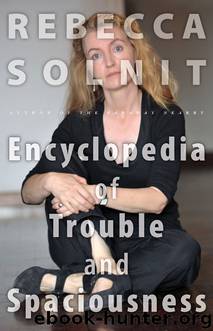The Encyclopedia of Trouble and Spaciousness by Rebecca Solnit

Author:Rebecca Solnit [Solnit, Rebecca]
Format: epub
ISBN: 9781595341990
Publisher: Perseus Books, LLC
Iceland’s national parliament, or Althing—the word for “assembly” being, in Icelandic, thing—was formed in 930 AD, about sixty years after the first settlers came over from Norway. They met at a site whose name, Thingvellir, “the plain of the thing,” still commemorates this ancient annual gathering, which was a combined parliamentary session, court review, and country fair. I visited it on a pleasant May day when a down jacket and lined gloves were the right attire, and wild ducks and geese called overhead. I was driving in my rented car across a high plain strewn with volcanic debris—big, twisting, dark boulders upholstered in pale, thick moss that disguised jagged edges and crevices—when suddenly half the landscape dropped away and I began a descent into the wide valley created by the meeting of the Eurasian and North American tectonic plates. A long ledge of dark gray stone eighty or a hundred feet high ran along the far end, and the Axe River dropped off this ledge (in a foaming waterfall that in another country might itself be a big tourist attraction) and into the grassy valley below, where other streams braided together to create a web of estuaries and tiny islands. On the far side of this riparian oasis was a series of long stony fissures, from a few feet to perhaps twenty feet wide, filled with astonishingly clear deep-blue water, a canyonland in miniature with its own flora of mosses, grasses, and stunted trees. The Thingvellir region, like much of Iceland, is as lush as Ireland and as harshly grand as Utah.
The old Icelanders gathered here in the uninterrupted light at midsummer every year, and the lögsögumadr, or law speaker, recited one-third of the nation’s laws, so that the whole code would be declaimed every three years. Courts met to deliberate transgressions, and new laws were made. Informal lawyers negotiated, and judges settled the penalties for unlawful violence, theft, and other crimes—fines were levied for most offenses and exile imposed for the worst. No one was imprisoned.
I was reading Njal’s Saga when I visited, which chronicles several generations of feuds that were occasionally resolved by the lawyerly Njal’s visits to the Althing. The sagas written down in the twelfth and thirteenth centuries are the great literary patrimony of Iceland, where the language has changed so little that modern Icelanders can still more or less read them. Njal’s careful legal deliberation, though, was an odd contrast to much of the saga’s grisly violence, as though Black’s Law Dictionary had been spliced into Grand Theft Auto. At one point, Njal notes the importance of the rule of law—“With laws shall our land be built up but with lawlessness laid waste”—and not many pages later, his eldest son catches sight of his enemies on an ice sheet beside the river and, in a celebrated passage, decides to make the most of the opportunity:
Skarp-Hedin made a leap and cleared the channel between the ice-banks, steadied himself, and at once went into a slide: the ice was glassy-smooth, and he skimmed along as fast as a bird.
Download
This site does not store any files on its server. We only index and link to content provided by other sites. Please contact the content providers to delete copyright contents if any and email us, we'll remove relevant links or contents immediately.
Periodization Training for Sports by Tudor Bompa(8253)
The Body: A Guide for Occupants by Bill Bryson(5080)
The MacArthur Bible Commentary by John MacArthur(4823)
The Sports Rules Book by Human Kinetics(4379)
What It Really Takes to Get Into Ivy League and Other Highly Selective Colleges by Hughes Chuck(3746)
Marijuana Grower's Handbook by Ed Rosenthal(3676)
The Sprouting Book by Ann Wigmore(3587)
The Martian by Andy Weir(3414)
Salt, Fat, Acid, Heat: Mastering the Elements of Good Cooking by Nosrat Samin(3140)
The Bread Bible by Rose Levy Beranbaum(3066)
Sapiens and Homo Deus by Yuval Noah Harari(3065)
Harry Potter 4 - Harry Potter and The Goblet of Fire by J.K.Rowling(3060)
The Marketing Plan Handbook: Develop Big-Picture Marketing Plans for Pennies on the Dollar by Robert W. Bly(3047)
Classic by Mary Berry(3010)
Martha Stewart's Baking Handbook by Martha Stewart(2854)
Screenplay: The Foundations of Screenwriting by Syd Field(2636)
The Plant Paradox by Dr. Steven R. Gundry M.D(2611)
50 Economics Classics by Tom Butler-Bowdon(2568)
The Cambridge Grammar Of The English Language by Rodney Huddleston Geoffrey K. Pullum(2417)
